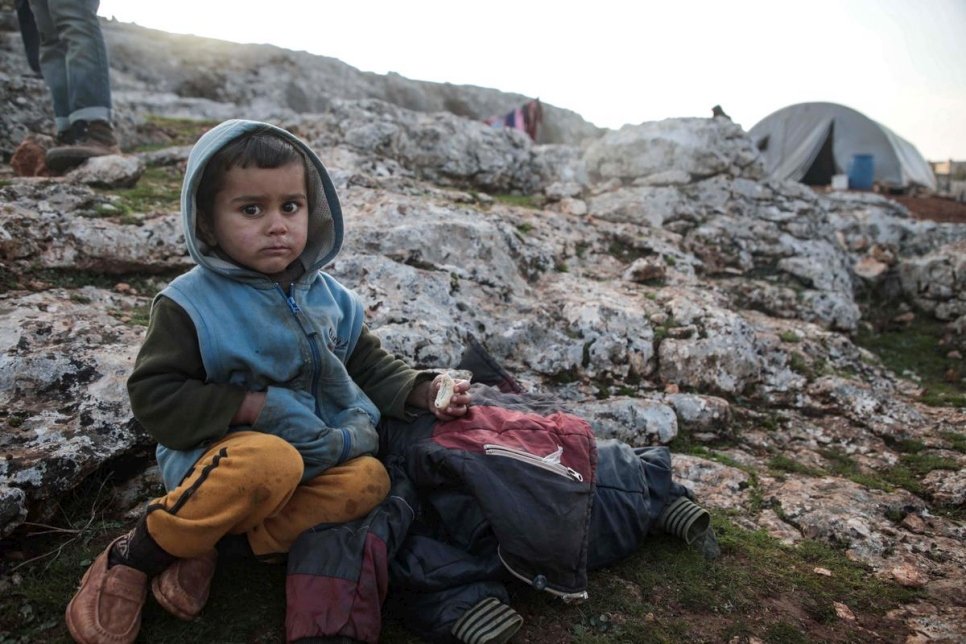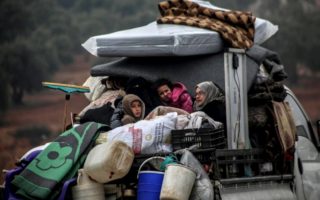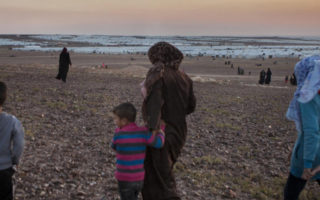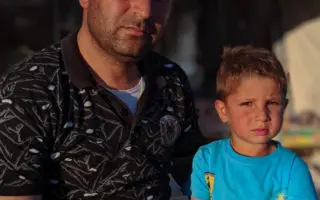
More than 80 per cent of recently displaced 900,000 Syrians in Idlib are women and children. Their needs are dire and many are exposed to harsh winter weather. © Ritzau Scanpix
With the dramatically worsening situation in Syria’s Idlib province, where close to a million people are in grave danger, UN High Commissioner for Refugees Filippo Grandi supports calls for a cessation of hostilities and appeals for urgent action to allow people trapped in the conflict to move to places of safety.
More than 900,000 people are estimated to have fled their homes or shelters in Idlib in recent months. Most are now in northern Idlib and Aleppo governorates, compounding the already disastrous humanitarian situation there, amidst freezing conditions.
“We need an end to the fighting, and access to safety to preserve lives,” said the High Commissioner. “The UN Secretary-General has appealed for parties to the conflict to respect the rules of war. Every day that passes, that call is more urgent. Thousands of innocent people cannot pay the price of a divided international community, whose inability to find a solution to this crisis is going to be a grave stain on our collective international conscience.”
“As in the past, in moments of crisis, I am also appealing for neighbouring countries, including Turkey, to broaden admissions, so that those most in danger can reach safety – even knowing that capacities and public support are already strained,” Grandi said. “For these countries, already hosting 5.6 million refugees, of whom 3.6 million are in Turkey, international support must be sustained and stepped up.”
It is estimated that there are currently over four million civilians in north-west Syria. More than half are internally displaced. Many have been living in displacement for years and have been forced to flee several times. Some 80 per cent of the newly displaced are women and children. Many elderly people are also at risk.
The UN and other partners in Syria and elsewhere have been working over weeks to help displaced people in the Idlib area. Given the intensity and scale of displacement, shelter needs are critical. The harsh winter weather – including snow, flooding, sub-zero temperatures and rising fuel prices – are adding to the difficulties and suffering.
Humanitarian organisations are trying to reach people by all means possible, including through cross-border shipments of shelter and emergency aid kits from Turkey. Local partners on the ground are striving to continue to provide psychosocial support, legal counselling and assistance, and to help vulnerable people get access to basic services – but many of them are themselves caught up in the turmoil.
Safe humanitarian access, and the safety of humanitarian workers, must be ensured. UNHCR is seeking to help up to 275,000 people (55,000 families) with essential aid items and to assist another 84,000 people within Idlib with shelter (14,000 families). It has also prepositioned stocks in the region to meet the immediate needs of up to 2.1 million people, including tents for 400,000.
“Let me be clear,” said Grandi. “As humanitarian agencies, we are striving to save lives, but the space for these efforts is shrinking. In the face of such suffering, humanitarian aid alone cannot be the answer.”
For more information on this topic, please contact:
- In Amman, Rula Amin, aminr@unhcr.org, +962 (0)790 04 58 49
- In Amman, Andreas Kirchhof, kirchhof@unhcr.org, +962 791 825 473
- In Ankara, Selin Unal, unal@unhcr.org, +90 530 28 27 862
- In New York, Kathryn Mahoney, mahoney@unhcr.org, +1 347 443 7646
- In Geneva, Andrej Mahecic, mahecic@unhcr.org, +41 79 642 9709
Originally published by UNHCR on 20 February 2020





